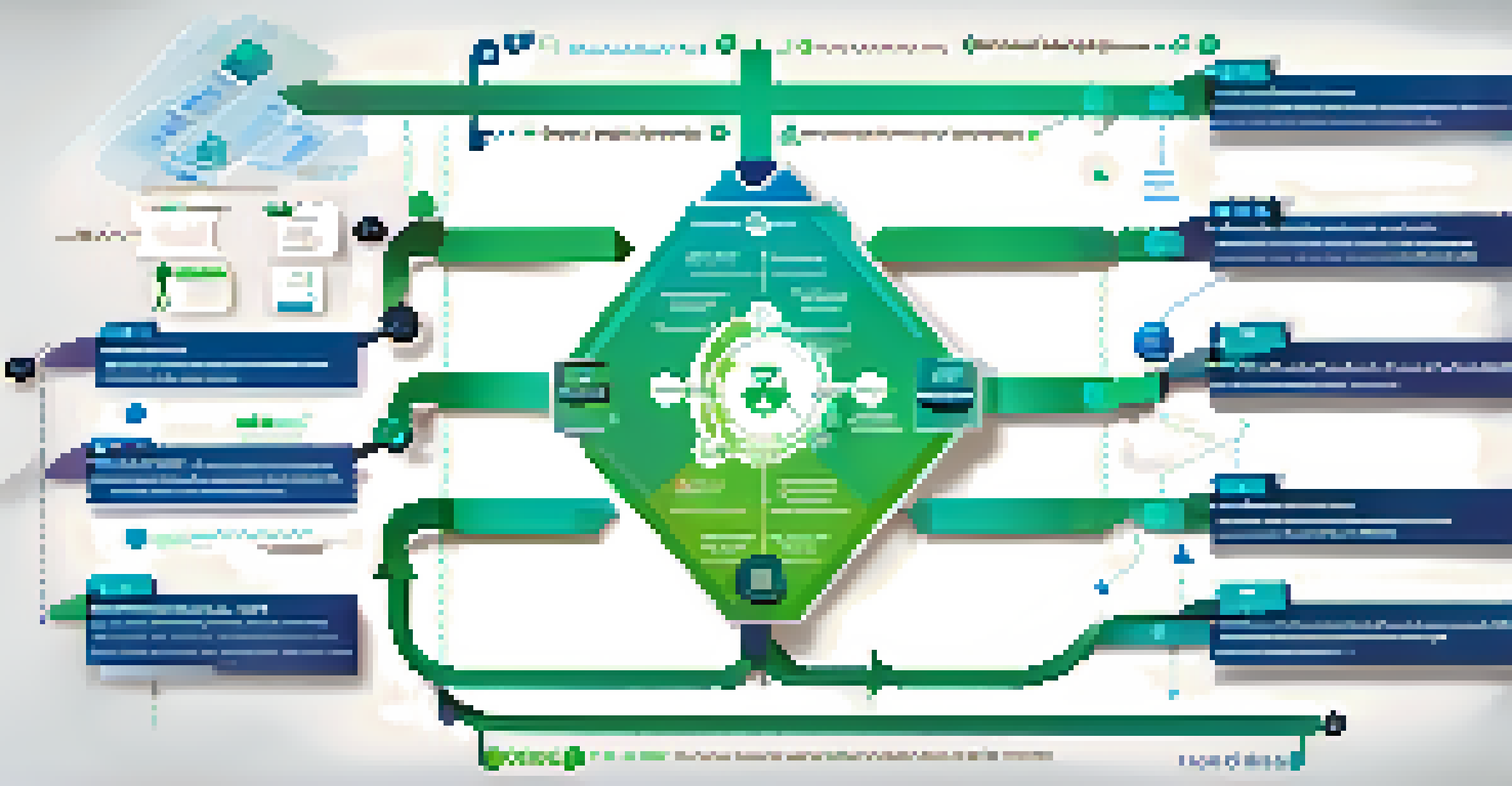How Decentralized Oracles Improve Smart Contract Functionality

Understanding Smart Contracts and Their Limitations
Smart contracts are self-executing agreements with the terms written into code. They operate on blockchain technology, ensuring transparency and trust. However, these contracts are limited by the data they can access; they can't pull information from the outside world directly, which can restrict their functionality.
Smart contracts are not just the future of agreement; they are the future of trust.
For instance, a smart contract that governs a betting application can only function properly if it has access to real-time data about the sporting event in question. Without this external information, the contract may not execute as intended, leading to disputes and inefficiencies.
This limitation highlights the need for a solution that bridges the gap between blockchain and real-world data. Enter decentralized oracles, which serve as vital intermediaries to feed necessary information into smart contracts.
What Are Decentralized Oracles?
Decentralized oracles are systems that enable smart contracts to access off-chain data in a secure and reliable manner. Unlike traditional oracles, which rely on a single source of truth, decentralized oracles aggregate data from multiple sources. This approach enhances security and reduces the risk of manipulation.

Imagine a weather-based insurance smart contract that pays out if it rains. A decentralized oracle would collect weather data from numerous trusted sources, ensuring that the decision to pay out is based on accurate and consensus-backed information.
Smart Contracts Need Real-World Data
Smart contracts are limited by their inability to access external data, which can hinder their functionality.
By distributing data collection and validation across a network, decentralized oracles provide a layer of reliability that is crucial for the robust functioning of smart contracts, ultimately fostering user trust.
Key Benefits of Using Decentralized Oracles
One of the primary benefits of decentralized oracles is improved security. By minimizing reliance on a single data source, they reduce the risk of data tampering or fraud. This security is essential, especially for applications dealing with financial transactions or sensitive information.
The most exciting thing about decentralized oracles is their ability to connect the blockchain world to real-world data, opening up endless possibilities.
Moreover, decentralized oracles enhance the functionality of smart contracts across various industries, from finance to supply chain management. For example, a supply chain contract can automatically trigger payments based on real-time shipment tracking data, ensuring that all parties are fairly compensated.
Additionally, the transparency provided by decentralized oracles allows all parties involved to verify the data being utilized, further building trust in the system and encouraging wider adoption.
Real-World Applications of Decentralized Oracles
Decentralized oracles are finding diverse applications across different sectors. In finance, they enable decentralized finance (DeFi) platforms to access real-time price data for cryptocurrencies, facilitating trades and lending protocols. This accessibility is crucial for maintaining the integrity of financial transactions.
Another notable example is in the insurance industry, where decentralized oracles can automate claims processing by verifying real-world events, such as natural disasters. This automation not only speeds up the claims process but also reduces operational costs for insurers.
Decentralized Oracles Enhance Security
Decentralized oracles provide a secure way for smart contracts to access off-chain data by aggregating information from multiple sources.
Lastly, gaming and NFT marketplaces are leveraging decentralized oracles to provide verifiable randomness for in-game events and asset distribution, ensuring fairness and transparency in gameplay.
How Decentralized Oracles Enhance Data Accuracy
Accuracy is a significant concern when it comes to data feeding smart contracts. Decentralized oracles address this by aggregating data from multiple sources, minimizing the chances of errors that could arise from relying on a single provider. This collective approach ensures that the information fed into contracts is as accurate as possible.
For instance, if a smart contract relies on price data for a cryptocurrency, using a decentralized oracle means it can compare prices from various exchanges. This prevents potential discrepancies that could affect the contract's execution and outcomes.
Ultimately, this heightened accuracy not only boosts the reliability of smart contracts but also fosters a healthier ecosystem for decentralized applications.
Challenges and Considerations for Decentralized Oracles
While decentralized oracles offer numerous advantages, they are not without challenges. One significant concern is the complexity involved in setting them up and ensuring that they operate effectively. Developers must carefully select which data sources to use and how to validate the information being aggregated.
Moreover, the decentralized nature of these oracles can lead to issues with latency, as gathering data from multiple sources may take longer than retrieving it from a single provider. This delay can impact the timeliness of smart contract execution, especially in fast-paced industries like finance.
Real-World Applications Abound
Decentralized oracles are being utilized in various sectors, including finance and insurance, to automate processes and improve efficiency.
Despite these challenges, ongoing innovations in oracle technology continue to address these issues, making decentralized oracles an increasingly viable solution for enhancing smart contract functionality.
The Future of Decentralized Oracles and Smart Contracts
The future of decentralized oracles looks bright as more industries recognize their value in enhancing smart contracts. As blockchain technology continues to evolve, the integration of decentralized oracles will likely become a standard practice to ensure that smart contracts operate efficiently and reliably.
Emerging trends, such as the development of hybrid oracles that combine both decentralized and centralized elements, may offer even greater flexibility and adaptability in accessing real-time data. This fusion could cater to various application needs while maintaining a level of security.

Ultimately, as decentralized oracles become more sophisticated, they will play an essential role in the maturation of decentralized applications, paving the way for innovation and broader adoption of smart contracts across various sectors.